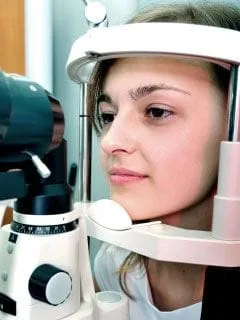
The AVDC doctors have been specially trained to evaluate several important areas of vision that often go unchecked during standard "20/20" visual acuity tests. Our comprehensive vision exams include the following:
Acuity at Near and at a Distance
We test how clearly and accurately a person sees at both 20 feet and at close reading distance
Focusing Skills
We test how well and quickly the eyes are able to adjust their focus on objects at different distances. The eyes’ ability—or inability—to rapidly and automatically adjust focus affects everything from participating in sports to reading and writing in educational and work settings. For example, children with focusing problems may struggle with school work. Also, patients with acquired brain injury (ABI) (for example trauma, accident or stroke) may find it difficult after the ABI to read due to loss of place while reading.
Eye Teaming
These tests asses how well your eyes work as a team. Problems with eye teaming can cause depth perception and eye-hand coordination difficulties.
Eye Movement
These tests determine how well the eyes can perform tracking and fixating functions; for example, how well can a student go from reading a line of text at reading distance to following along with the teacher at the front of a class room. Tracking and fixation also affect hand-eye coordination and reaction time.
Reversal Frequency
We test how well you mind your p’s and q’s, b’s and d’s and even short words like “was” and “saw.” When children over the age of 7 persistently confuse these letters, there may be a visual perception problem.
Visual Memory and Visual Perception
This portion of the exam determines how well you are able to gather, store, and recall information collected by the eyes.
Visual Motor Integration Testing
These tests asses your ability to coordinate visual input with information from your other senses, such as touch (hand-eye coordination) and hearing (balance), etc.
Why Are These Vision Exams So Rigorous?
If this list of vision exams seems rigorous, you are right. The breadth and depth of these tests enable us to develop comprehensive therapy programs for our patients.
We recommend that all children begin vision testing at 8 months old, and each year after to be proactive in assessing for good visual health and development. Early diagnosis of problems like Amblyopia (Lazy Eye), Strabismus (Eye Turn), Convergence Insufficiency and other problems can help children overcome and possibly avoid struggling with learning disabilities like dyslexia and conditions like attention deficit (ADD/ADHD).
Adults should also have annual vision testing to catch problems like macular degeneration, glaucoma, diabetes, and cataracts, early, when treatment is more effective.
Patients in which trauma have occurred, for example stroke, motor vehicle accidents, sports injuries, etc… can also benefit for assessment of reestablishing visual control after an acquired injury.
We can also use these tests to assess and develop treatment plans for patients with sensory integration difficulties, autism, and also patients that are non-verbal.
With society becoming ever so technologically based with phones and computers being the normal for even the youngest of age, eye strain and myopia development is of concern. Eye strain is on the rise and proactive understanding of what we need to do ergonomically at school and home and at work can also be assessed to ensure visual performance to be at its optimal.
Call 479-478-8860 to schedule an appointment for your vision exam today!

